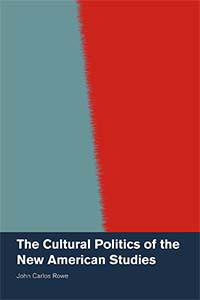The Cultural Politics of the New American Studies
by John Carlos Rowe

- Published: 2012
- ISBN: 978-1-78542-007-8
- PDF ISBN: 978-1-78542-013-9
In The Cultural Politics of the New American Studies, leading American Studies scholar John Carlos Rowe responds to two urgent questions for intellectuals. First, how did neoliberal ideology use the issues of feminism, gay rights, multiculturalism, transnationalism and globalization, class mobility, religious freedom, and freedom of speech and cultural expression to justify a new “American Exceptionalism,” designed to support U.S. economic, political, military, and cultural expansion around the world in the past two decades?
Second, if neoliberalism has employed successfully various cultural media, then what are the best means of criticizing its main claims and fundamental purposes? Is it possible under these circumstances to imagine a “counter-culture,” which might effectively challenge neoliberalism or is such an alternative already controlled and contained by such labels as “political correctness,” “the far left,” “radicalism,” “extremism,” even “terrorism,” which in the popular imagination refer to political and social minorities, doomed thereby to marginalization?
Rowe argues that the tradition of “cultural criticism” advocated by influential public intellectuals, like Edward Said, can be adapted to the new circumstances demanded by the hegemony of neoliberalism and its successful command of new media. Yet rather than simply honoring such important predecessors as Said, we need to reconceive the role of the public intellectual as more than just an “interdisciplinary scholar” but also as a social critic able to negotiate the different media.
“This book offers a fascinating window onto the political challenges facing academics during the Bush years.”Andrew McCann – Dartmouth College
Author Bio
John Carlos Rowe is USC Associates’ Professor of the Humanities and Chair of the Department of American Studies and Ethnicity at the University of Southern California. From 1975-2004, he taught at the University of California, Irvine, where he was Chair of the Department of English and Comparative Literature, Director of African-American Studies, Chair of Comparative Literature (during its successful move to departmental status), Director of the Critical Theory Emphasis, and Director of the Critical Theory Institute (sponsor of the annual Wellek Library Lectures in Critical Theory and three-year research projects, both series published by Columbia University Press), which he helped found in the mid-1980s.
